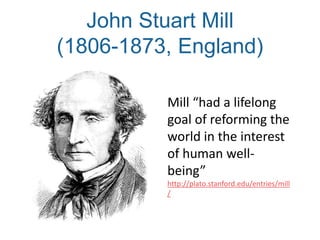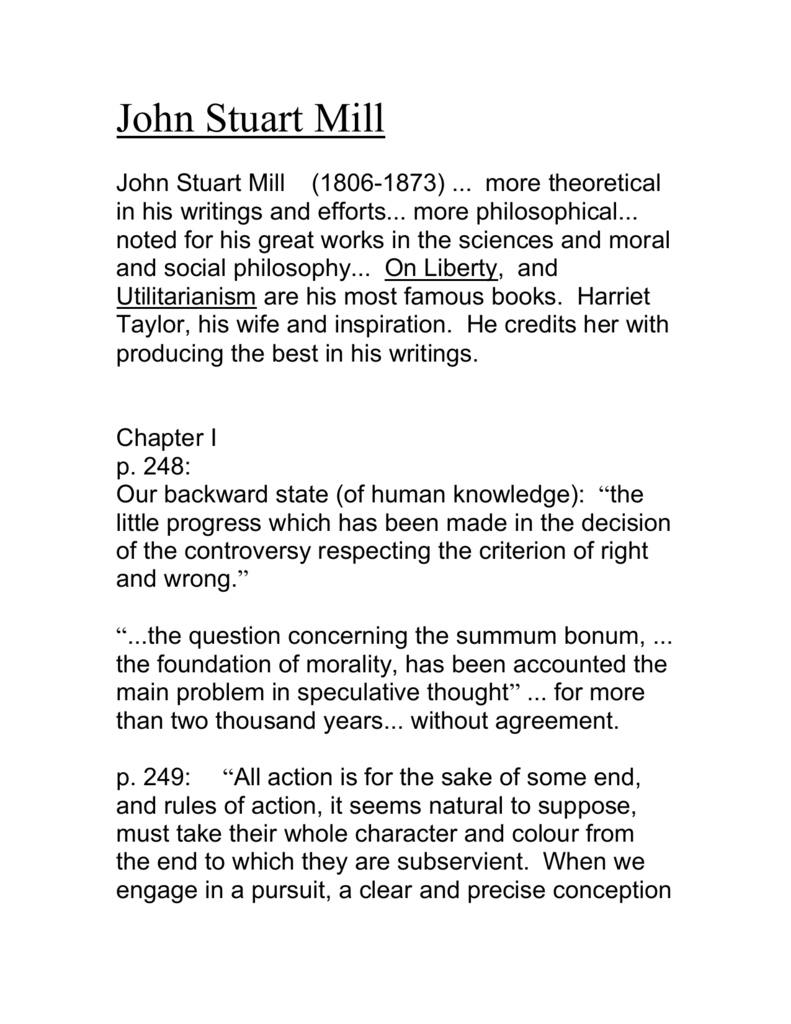Some pleasures are higher than others and thus more valuable. John Stuart Mills ethics are based on the principle of morality being defined by the promotion of happiness.
Descriptive Relativism can best be defined as.

. Moral Realism can best be defined as. John Stuart Mill Utilitarianism. Also the absence of pain or creation of conditions that will not make others suffer is the necessary duty of every individual.
For him we should act to achieve the greatest good for the greatest number. 1 that government is good insofar as it promotes the common good where this is conceived of as promoting the moral intellectual and active traits of its citizens and 2 that government is good insofar as it makes effective. GENERAL REMARKSThere are few circumstances among those which make up the present condition of human knowledge more unlike what might have been expected or more significant of the backward state in which speculation on the most important subjects still lingers than the little progress which.
Actions are right or wrong based upon whether they produce happiness or unhappiness b. The belief that there are mind-independent facts about ethics that are true and binding even if we have beliefs to the contrary. John Stuart Mill embraces a version of consequentialism called utilitarianism.
The Five Branches Of Ethics. In particular Mill thinks that representative democracy is best when it is best because it best satisfies two criteria of all good government. Ethics word conceptualized from the Greek word Ethos implying culture -- the actual frequent conduct inside community.
There also is act utilitarianism and rule utilitarianism. Deontology names a type of ethical theory that judges human practices based on whether they are consistent with certain duties that. Utilitarianism is a moral theory that states an action is morally right if and only if it produces more or at least the same amount of good called utility as any other alternative action available to the person.
Going back to the case about lying to your friend. Which best describes John Stuart Mills Greatest Happiness Principle. Social and economic inequalities should be arranged such that they are to the greatest benefit of the least well off and everyone has equal access to opportunity.
It is the focus of this paper to show why John Stuart Mill believes one should be moral under Utilitarianism. Ethical Decision Making John Stuart Mill suggests that a persons ethical decision-making process should be based solely upon the amount of happiness that the person can receive. All pleasure is equally valuable.
The belief that moralities and. Classic Utilitarianism was advocated by such philosophers as Jeremy Bentham and John Stuart Mill. Utilitarianism is a form of consequentialism Which best highlights how Utilitarianism is totally.
Actions are right or wrong. Which of the following best describes Utilitarianism. Socrates And John Stuart Mill.
Utilitarianism by John Stuart Mill is an essay written to provide support for the value of utilitarianism as a moral theory and to respond to misconceptions about it. One of the most influential thinkers in the history of classical liberalism he contributed widely to social theory political theory and political economyDubbed the most influential English-speaking philosopher of the nineteenth century. As a result its a rule or conduct connected with social approval.
He defended the freedom of individuals against absolute state power. The former focuses on individual acts. The one that maximizes utility should be performed.
It is the foundation that all people must hold as a setting point. In his discussion John Stuart Mill who is the advocate of utilitarian ethics tries to demonstrate that lying is generally wrong. Going back to the case about lying to your friend.
The belief that moral truths are actually only true relative to specific groups of people. The latter looks at kinds of acts that from experience we know tend to maximize utility. John Stuart Mill 1806-1873 is considered the most influential English-speaking philosopher of the nineteenth century.
John Stuart Mill believed in an ethical theory known as utilitarianism and his theory is based on the principle of giving the greatest happiness to greatest number of people Mill support the pursuit of happiness. At first one should consider the principle of utility according to which the morality of an action is evaluated by its actions. Which of the following best represents John Stuart Mills view of pleasure.
John Stuart Mill John Stuart Mills ethical system of utilitarianism is a system that is based on the foundation of Jeremy Benthams principle of utility which evaluates actions based on the actions consequences. Pleasure is one of many things that are intrinsically valuable. This type of ethical dilemma is exactly what 19th-century English philosopher John Stuart Mill was interested in.
John Stuart Mill 20 May 1806 7 May 1873 was an English philosopher political economist Member of Parliament MP and civil servant. Which statement best describes John Stuart Mills political philosophy. Moral Relativism can best be defined as.
Ethics implies customs or norms for the peoples conduct in society. When he was a kid Mills father was good friends with a philosopher named Jeremy. Mill believed that some pleasures the pleasures of the mind are qualitatively superior to other pleasures the pleasures of the body He writes better a Socrates dissatisfied than a pig satisfied the Trolley Problem.
Overall this argument is based on several claims. On the other hand Kant who believed in an ethical theory known as Deontologist and he believes that only principle of actions matter and moral decisions. Also Bentham defines happiness as pleasure and states that the right action is the action that produces the most happiness for the greatest number of people.
David Velleman A Brief Introduction to Kantian Ethics Onora ONeill Kantian Approaches to Some Famine Problems. He was also an outspoken feminist publishing The Subjection of Women in 1869 to promote equality between men and women. John Stuart Mill 1806-1873.
For a utilitarian its right to lie to your friend to protect your other friends secret info just in case doing so produces the greatest balance of happiness over unhappiness. Mill defines utilitarianism as a theory based on the principle that actions are right in proportion as they tend to promote happiness wrong as they tend to produce the reverse of happiness. Although Mill fully justifies himself his approach lacks certain criteria for which happiness can be considered.



0 Comments